Craig R. Hipkins's Blog
January 11, 2025
William Cullen Bryant: To A Waterfowl
By Craig: I don't read a lot of poetry. I mostly read novels, history and science books. However, certain poems strike my fancy. One of these is W. C. Bryant's To A Waterfowl. I am not certain when Bryant wrote it, but I imagine it was one of his earlier poems. To me, it is his best. A man stands on the shore near dusk and observes a waterfowl. Bryant doesn't specifically tell the reader what kind. It doesn't really matter. I assume it is a goose, or perhaps a duck. Gracefully, it glides through the cold sky until it finally its majestic form amalgamates with the inky darkness of the evening.

What is Bryant attempting to convey? It is a metaphor. The observer, at first feels the loneliness of the bird. However, he soon comes to realize that the bird is not alone. It is being guided by nature, or God. It might be alone, but it is not lost. The observer, then realizes that, like the bird, he too is guided by a higher power. Below is the poem in its entirety.
To A Waterfowl
By: William Cullen Bryant (1794-1878)
Whither, midstfalling dew,
While glow theheavens with the last steps of day,
Far, through theirrosy depths, dost thou pursue
Thy solitary way?
Vainly the fowler’seye
Might mark thydistant flight to do thee wrong,
As, darkly seenagainst the crimson sky,
Thy figure floatsalong.
Seek’st thou theplashy brink
Of weedy lake, ormarge of river wide,
Or where therocking billows rise and sink
On the chafedocean-side?
There is a Power whose care
Teaches thy way along that pathless coast-
The desert and illimitable air-
Lone wandering, but not lost.
All day thy wings have fanned,
At that far height, the cold, thin atmosphere,
Yet stoop not, weary, to the welcome land,
Though the dark night is near.
And soon that toil shall end;
Soon shalt thou find a summer home, and rest,
And scream among thy fellows; reeds shall bend,
Soon, o'er thy sheltered nest.
Thou'rt gone, the abyss of heaven
Hath swallowed up thy form; yet, on my heart
Deeply has sunk the lesson thou hast given,
And shall not soon depart.
He who, from zone to zone,
Guides through the boundless sky thy certain flight,
In the long way that I must tread alone,
Will lead my steps aright.
December 31, 2024
A Lost Moment in time: Cyrus J. Clapp & the 6th New Hampshire Infantry Regiment
I am a member of the Sons of Union Veterans of the Civil War. Yup, my grandfather was a member, my great grandfather was a member and my great-great grandfather was a veteran of the 57th Massachusetts Infantry and GAR member. I have his GAR medal along with a medal from an encampment that he attended back in the 1890s. I also had a great-great-great grandfather that served in the 1st Rhode Island Cavalry. Both of these men survived the war, and lived for many years after it. I have always been patriotic. I don't apologize for that. I was a boy scout and then a marine. My family has a history of serving in the military, on my mother's side in the United States, my father's side Great Britain. Both flags are displayed in my library. However, out of all my family members that have served in the military in the course of the last two-hundred years from Waterloo to the present, I have found only one who actually died in action. He was my uncle. His name was Cyrus Jones Clapp and this is his story.
Cyrus J. Clapp was born April 28, 1839 in Leicester Massachusetts. His parents were Lovell Clapp and Martha Jones. Cyrus was named after his maternal grandfather Cyrus Jones (1791-1846), who was a veteran of the War of 1812, and a hero to boot. Cyrus Jones was commissioned Captain of of a company in the 3rd Regiment of Infantry, 1st brigade, 12th Division of the Massachusetts State Militia. At the time, Maine was still part of Massachusetts. Captain Jones delivered a load of specie in a four-ox team in the winter from Portland to Canada, which must have been quite an adventure.
Cyrus J. Clapp had two brothers, Charles, born in 1840 and Albert born in 1841 and a sister Eliza Ann born in 1843. Leicester was a small New England mill town at the time. Cyrus' father worked in one of these mills and also worked his trade as a carpenter. Cyrus would have attended the local school with his brothers and possibly have known about the Leicester's Underground Railroad stop. Did this play into his future decision to enlist during the Civil War? I do not know. I wish that I did, but I will never know, unless a letter surfaces one day. Tragedy struck Clapp family and Cyrus when his mother passed away suddenly on February 01, 1847. Her cause of death is listed as "Brain Fever." This is an archaic term that was used to denote any number of illnesses that effected the mental state of a patient. In all probability Martha Clapp died of an infection due to either Meningitis, Encephalitis or Scarlet Fever. It was probably quick and sudden and it gave no time for Lovell Clapp to prepare for the care of his family which he almost certainly could not do himself as will be shown. Martha was only 28 years old when she died and Cyrus was not yet 8 years of age at the time.
The family must have been distraught at this event and it would change Cyrus' life. Lovell was now a single father of 4 children between the ages of 3 and 7. In order to support them he would have to work. Who would watch the youngest ones while he provided for the family? Cyrus, as the oldest was not yet 8. Too young to take care of his brothers and sisters. The children were sent to live with other families. Cyrus was sent to live in a boardinghouse in Oakham Massachusetts, a very small town a few miles to the northwest of Leicester. He attended school there and must have helped earn his meals and lodging by doing odd chores around the house and property, probably supplemented by his father who was living in nearby Templeton. It is probable that he visited with his father at times, but it must have been hard. It was 20 miles from Templeton to Oakham and this was in the days before rail travel was common. He would have probably hopped on the back of a wagon and hitched a ride if he wanted to visit his father.
Fort Sumter was attacked on April 12, 1861 and Cyrus enlisted in the 2nd Regiment Massachusetts Infantry shortly after this, probably in response to Lincoln's call. It must have been a sense of duty, or tradition that called him to arms along with an opportunity and a chance to make something of himself. He mustered out of the 2nd Massachusetts as a Private and then headed to Rindge New Hampshire where his younger brother Albert was living. While he was there he decided to enlist again, this time in the 6th New Hampshire Infantry.
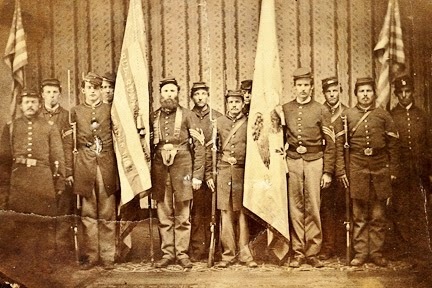 6th New Hampshire Infantry Regiment
6th New Hampshire Infantry RegimentCyrus enlisted in Company K and when the Company was filled reported to Camp Brooks in Keene. The Regiment left Keene on Christmas 1861 on a train bound for Norwich where they boarded the steamer Connecticut for their journey south. It was to be the last time that Cyrus ever saw New England and he must have realized that there was a chance that he would never return.
The 6th N.H. landed on the coast of Cape Hatteras on January 12, 1862. A lot of the men were sea sick as they had run through a patch of bad weather. They were held as a reserve unit along with the 48th Pennsylvania. The 6th's first battle was at South Mills on April 19, 1862. Engaging the 3rd Georgia, they put that regiment to flight with only one killed and two wounded. They joined the 1st Brigade of the 9th Army Corps.
To be Continued....
September 14, 2023
Our Dystopian World.
By Craig: I write, read and run. Most of my reading and writing material is historical. I am really not into this century. In fact, this century, which had so much promise in the last century is a huge disappointment. They can't handle it. We are now almost a quarter of the way through this century and our civilization seems to be in decline. I am not surprised. People are spoon fed too much information. It is information overload. Most of it is not real. What is real, is often distorted or not factual. I don't watch the news. If I wanted to watch propaganda, on news networks like CNN, FOX or MSNBC I would watch old dystopian science fiction movies. We still live in a tribal society. Despite advancements in technology, not much has changed since the days of Nero fiddling while Rome burned. People are still angry and mad and violent.
Sometimes I feel as if I were meant to live my life on the little white sailboat in Thomas Cole's painting The Titan's Goblet. I could sail around all day, and at night, live on the perimeter of that world in the small house in the background. Beyond my little world would be the world of everyone else. I might hear noise from down below. The rabble fighting and killing each other. Then, for a while, there would be silence. Then it would start all over again. The process repeating itself over and over and over until one day the Earth overheated and the noise would finally cease. The Earth would groan and mumble at this minor inconvenience called humankind but finally it would belch, and it would become free.
Sometimes I feel like Washington Irving. I'll stand behind a bush in a garden and watch a garden party but not take part. I am an observer. Nothing more, nothing less. Besides my novel writing (which hardly anyone reads) I spend my time hustling for money to pay for my son's college and playing Immaculate Grid (Does anyone remember Kevin Stacom?) I recently celebrated my 55th birthday. Where is life taking me? The caption under my High School yearbook photo says "I'm on my way. I know not where." 37 years later I still don't know. Where is this blog post going? I don't know...

March 4, 2023
A Lost Moment in Time: The Forgotten Man on the Porch
The black and white photograph is so old that it seems to be crumbling inward from the perimeter towards the center. Of course, the condition was not helped much by the fact that it spent nearly half a century in a moldy box in the damp basement of my grandmother's house. The photo was taken some time in the early 20th century. If I were to make an educated guess, I would say it was snapped during the Coolidge administration. A nice white house is the subject of the photo. The shutters seem old and in need of repair. Ivory climbs up the side of the porch. I cannot say if it is a front porch or a back porch. Then, in the shadows under the overhang, sits a man. Who is he? What is he doing?
I cannot tell. Time and living memory have erased anything about this photograph. I only know that my 80-year-old father, who is now suffering with the advanced stages of Parkinson's disease and dementia found the photograph, along with dozens more in his mother's basement back in 1988. Some of the photographs were stuck together. Only a few were spared the ill effects of time. Some of them were wholly obliterated by mold. My father, when he was younger, thought the man in the photograph might be his Great-Grandfather Anders Jacobsen, a Danish immigrant farmer who died in 1924, or possibly one of his sons. My grandmother never would say. If she knew, she died with the secret. Not that it matters. The man in the photograph has long ago given up his mortal cares. He now survives, hidden in the dark shadows of a porch of a rustic farmhouse, tethered to existence by the obsessive inquiry of a man who may or may not be his great-great grandson. "I once existed," he calls out from the past. "Don't forget me!" Is he calling out in Danish or English? Perhaps both? The haunting photograph will linger in my memory until one day I too shall succumb to time's inevitable calling.
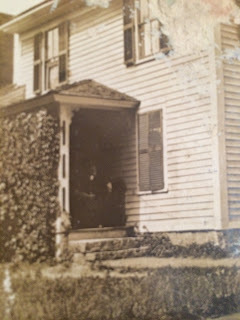
March 14, 2022
Ouida: Signa
By Craig: I read a lot of books. Most of the books I read are from authors long dead. Authors mouldering in their graves for decades or even centuries. Their voices muted but not wholly extinguished. One of these authors of yore was a prolific writer in the late 19th century. Maria Louise Ramé AKA 'Ouida' as she preferred to be called, was the author of numerous novels and short stories. I was familiar with a few of her stories. When I was a young boy, I read A Dog of Flanders. I had almost forgotten about her and indeed it had been many years since the name 'Ouida' had even crossed my mind. It came back to me when I came across her once again while reading about one of my favorite writers, Jack London. I have read a good portion of London's work and read that one of the reasons he decided to become a writer was after reading Ouida's book Signa. I had never heard of this book, but since London thought it was such a great novel, I decided to give it a try. I was not disappointed!
Signa was published in 1875 while Ouida was living in Italy. It tells the tale of a young genius named Signa who listens to the sounds of nature and sings at the country church. Signa plays the lute and has a melodious voice. Though he is a peasant, he is unlike the other young people in the town. He cares nothing about toiling the land. He would rather sing with the birds and dream of the music that forms in his head. He lives with his opportunistic uncle, Lippo and his wicked aunt Nita who thrash and abuse him on a daily basis. Signa seems to accept his lot in life until one day he sees a violin in a shop window and becomes obsessed in obtaining it.
Signa's origins are unknown to him. At a year old, he is found by his uncle's Bruno and Lippo during a flood next to his dead mother, Pippa who had tragically fell to her death off a cliff. Lippo, of course, is married and has a brood of children while his older brother, Bruno lives alone on a hillside farm, sulking in misery, years after the death of the woman he once loved. Most of Signa's life is harsh and brutal except for the time he spends with his uncle Bruno who makes it his life's quest to do right by the boy. Bruno is a solitary man who spends his days working the farm and doting on the boy who becomes a sort of obsession to him. Bruno lives for Signa, but Signa lives for his music.
Signa is also friends with Palma and Gemma, two sisters who live in the village. Palma is a plain hardworking girl and who secretly loves Signa, but the boy's affections are directed at the selfish and beautiful Gemma who makes him do things (like stealing) that are otherwise foreign to his character. One day, Bruno takes Signa to the city where a painter hears the boy sing and paints his picture, telling him that one day he will be famous. He gives Signa the money that he needs to buy the violin that he has longed to possess. However, when Lippo and Nita find out that he has spent the money on what they consider a toy, they are furious. Nita attempts to beat Signa but the boy finally fights back and injures Nita who swears revenge. Signa knows that if Bruno finds out that Lippo and Nita have been beating him that Bruno will kill his brother. In order to protect Bruno, Signa runs away, taking the opportunistic Gemma with him. Bruno finds out that Signa has gone and is devastated. He goes after them and eventually finds them about to embark on an ocean voyage under the insidious enticement of a scoundrel that uses children for his own monetary benefit. Signa willingly returns with Bruno as long as he promises to not hurt Lippo. Bruno then shelters the boy from his brother and as the years roll on Signa becomes restless. After an argument with Bruno, the man destroys his beloved violin in an act of rage. Bruno almost immediately regrets what he did and makes up for it by sending the boy to study music in the city. Eventually, Signa becomes famous for his operas. His travels back to Bruno and the farm become less frequent. The ending is a classic tragedy in the vein of a Shakespeare play.
The novel is written in a stylish prose that was common for the time but this in no way takes away from the story. In fact, it is the descriptive scenes of peasant life and nature that add to the novel's mystique. The character development in this book is beyond exceptional, especially Bruno who carries the novel and is one of the great personas of literature. I thoroughly enjoyed reading this story and rank it as one of the best books that I have ever read. It ranks up there in my estimation with Thomas Hardy's The Mayor of Casterbridge and Daphne Du Maurier's Jamaica Inn as one of my favorite novels. It is hard to believe that this timeless book is almost forgotten today. In fact, there are very few reviews of Signa that I can find online. If you get a chance give it a try.
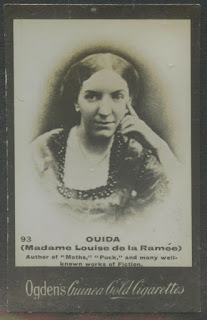 Ouida
Ouida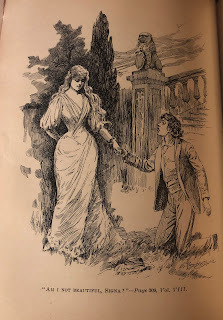
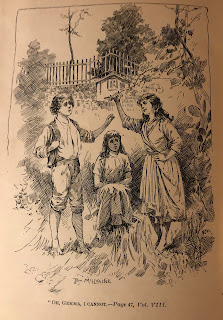

September 30, 2021
The Player
By Robbie: My dad and I were spending a usual day roaming through the antique malls in the Gaston county area. As I was looking around, I saw the usual stuff. Typically, what you might find in these certain establishments are the belongings of either a deceased individual or someone trying to sell a hand crafted product. I always see the typical Elvis Presley and Marilyn Monroe posters and vinyl records; jewelry of a woman who roamed the earth in the days of yore and even old works of art that have gone unappreciated. Perhaps, maybe the art they created didn't make sense to anyone else, but it did to the artist who created it. Sometimes these places really are sad, but nostalgic.

However, on this day I stumbled upon something interesting. It caught my eye as I gazed around the crowded stalls. It was a small trophy. It was a Best Supporting Actor award given out by the Little Theater of Gastonia to a one, Mr. Chuc Presley-Clubb. Immediately I began to wonder, who was this man? Obviously he gave a marvelous and noteworthy performance; at least according to the trophy which was dated in the 1996-1997 season. However, I wondered why his award was being sold in an antique mall? And why for $21.95? This didn’t make sense, so I did some investigating. A quick google search found that Mr. Presley-Clubb died on the 2nd of November 2018. Although I did not know this man I felt a little sadness in my heart. I did a little more investigating online and I stumbled across a video recording of a scene of the play that he had won the award for in the late 1990s. I watched it with unusual interest. The guy was funny! This, however, was the only record of any performance that he ever gave. At least that is all that I could find. When I looked at the views it had a respectable 5.8 thousand! I assume that after he died at the relatively young age of fifty two, his family and friends reminisced and watched the video. Now, here I sit today, reflecting. I am probably the only person who isn’t in his family that has any interest in watching it.
As it has been three years since his passing; Knowing very little of him and being only able to see clips of his performance I wondered what he wanted in life. Perhaps this was the start of an acting career that he had dreamed of pursuing or maybe he was just intrigued like so many others and said why not try out? What have I got to lose! Nevertheless, although Chuc Presley-Clubb did not make it to the status of Elvis Presley, he still did something. He accomplished something. He made people laugh! In life we look too much at the big things that we forget about the little things that make our existences tolerable. Mr. Presley-Clubb might not be entertaining people today, but I know this; based on the laughter and merriment in the audience that day back in 1997 season, Chuc did what he was good at. He fulfilled his purpose in life by making other peoples evenings a little bit better. Isn’t that the reason why we act? A real actor should be doing it for the craft and should not expect an enormous amount of praise for the work. Even though I don’t know how Chuc really was as a human being, I will say this. He did what he had to do in the time in which he was living. Some people affect the world in big ways and others in little ways. It doesn’t really matter which way you do it, because in the end we all face the same fate. Chuc, at least for one night of the fifty two years he spent on planet earth, accomplished something that he enjoyed doing and others enjoyed watching. He left the world a little better for it.
September 5, 2021
Welcome Robbie Hipkins to Craig & Jay's History of Anything!
I welcome my son, Robbie Hipkins to Craig & Jay's History of Anything. Robbie is a senior in High School and is an aspiring actor and writer. His first post is Bubba and His Path. I hope you enjoy it!

A Lost Moment In Time: Bubba & his Path
By Robbie: I can recall many fond memories from my formative years of a dog named Bubba. Bubba was not like most dogs of the modern day. Throughout the dog's entire life he lived and strolled with leisure around a certain quartet of houses where my father lives in North Carolina. I can distinctly remember the first time the dog came barging through the garage door like I was the intruder and this was his house! Indeed, it really was his abode. My dad didn't know it, but he came with the house! The dog lived a life of repetitiveness. His day would consist of going back and forth between four different houses. While visiting these houses he would get his daily dose of food from each of the suckers that lived there. Afterwards, he would most likely go hunt a squirrel or two, or collapse on the floor of whatever house he chose where he would let out a big fart; that would cause people to sometimes, on rare occasions, feel dizzy and faint!!
I choose to call this little snippet, Bubba's Path. Bubba, as long as I have been a resident at Hillside Drive, had always been there. It was as if he were a permanent resident that belonged to this street, and if removed would cause chaos and unbalance. I used to think: what is going to happen when the great Bubba finally dies? Could it be that Bubba is beyond death? That's impossible, I used to think, he has to die. He is an old dog! Probably as old as me and I am only a teenager! Finally, one day my question was answered. After almost a week of not seeing Bubba, my family and I began to get worried about what happened to the dog. We were told by our next door neighbors that Bubba had to be put down, because of the amount of pain he was in. At first, this made me cry, and it still does a little to this very day. The great Bubba of Hillside will no longer take his path around the quartet of houses on Hillside Drive. He has taken his final journey. Time has stopped ticking in his world. However, the memory is not gone. For as long as there are those alive that remember Bubba, he will not easily enter into the realm of oblivion. Nevertheless, one day, after living memory passes there will be no one to remember him; a big, friendly black dog with a full belly who left his mark. On that day, the only memory of Bubba would be if one happened to catch a glimpse of a ghostly canine strolling down the street, forever on his path.

April 2, 2021
Elements of Time: Ripley's Comic Digest # 1
By Craig: I have been collecting things since I was a small boy. My twin brother Jay was the same way. We collected baseball cards, stamps, coins, running medals and ribbons and of course, comic books. I can remember the excitement of waiting for the next issue of The Unexpected, or the House of Mystery to be released. We would ride our bikes to the next town where there was a small bookstore and check to see if the latest issue had arrived. We would also canvass the local flea market (Rietta Ranch in Hubbardston MA) and sometimes find old back issues of comics for a nickel or a dime. Some of these comics were in rough shape, with detached staples or simply missing the covers completely. We did not care. We were interested in the content inside of them. We would read anything that we could get our hands on that was interesting to us. Sometime during the summer of 1979, Jay and I found a table at the flea market that had a box of old comic books that peeked our interest. Inside the box were two old comic digests from the early 1970s. One of them was Boris Karloff's Tales of Mystery and the other one was Ripley's Believe it or Not! Of course, we had to have them and I do not even remember how much we paid for them. A quarter a piece perhaps? We were only 10 years old and in those days, a quarter was worth a lot more than it is today, especially for a kid. I can remember the day well. We brought them back to our house and took turns reading them.
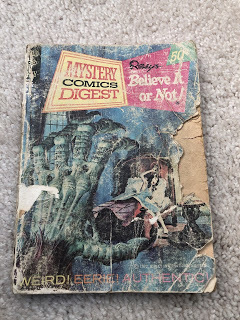
At some point, I don't remember when, the Boris Karloff digest disappeared. It must have been years ago, as I do not recall having seen it since I was a kid. My brother Jay kept the Ripley's digest until his death 3 years ago and it now resides with the rest of my comic books on a bookcase in my bedroom. As you can tell from the image above, this comic is well read. In fact, it is so well read that it appears that we almost devoured it! I picked it up just recently and read it again. The back cover is gone, swallowed by the ravages of time, or perhaps my brother mixed it with his oatmeal and ate it. Surprisingly, I still remember most of the stories in the book. There is the tale about old Simon who carry's his weighted sins in a large bag on his back. He is the subject of ridicule by the townspeople who throw rocks at him and mock him as he passes through. He is eventually murdered by a scoundrel named Langley who believes that Simon is carrying gold and silver in the bag. What Langley does not realize is that he is now destined to carry the bag weighted with his own sins. Another tale tells the story of Mary Walker who is murdered by two men in 1631 and convicted on the testimony of a ghost! Then there is the story of a French officer named Steingal who is warned of his impending death in battle by a dream. The last few pages of this story have been torn out of the digest. Did my brother add those to his oatmeal? I can still see my twin brother pedaling down the road in front of me, sometimes standing in the stirrups as he coasts down a hill with his wavy red hair blowing in the wind. He turns around and smiles.
July 5, 2020
Existentialism, Martin Heidegger & Sein Und Zeit
If one turns on the news today, it is fraught with danger, warnings and other unpleasant things. It is mere observation of events that are existing or not existing relative to the temporal state of ones own existence. One own existence is an aberration. A fleeting moment in time. Macbeth said it best and I quote:
Life's but a walking shadow; a poor player, that struts and frets his hour upon the stage, and then is heard no more: it is a tale told by an idiot, full of sound and fury, signifying nothing.
This is nihilism in its finest moment. But, thankfully, nihilism in its true, pure, and unfettered form cannot ever exist. Even as I examine the words that I just typed, it dies before it ever has a chance to live. The reason for this, is that existence itself is based on awareness. Without awareness or consciousness nothing can truly exist. Matter itself becomes irrelevant and meaningless just as the words that I just typed and the contradictions that I just found by reading them. Are we not all contradictions? Each day we plod onward toward a future that will one day be swallowed up by time's perpetual and infinite corridor, yet we continue to move along the linear plane as if we had some stake in it. The future, as a term and concept, is meaningless and at the same time isn't. How can this be? Infinity makes time meaningless. It is the one constant, the numerator and the denominator divided by zero.
"Where am I going with this? I do not know. I am still waiting for Godot to meet me at the tree of existence and tell me.




